新版PEPUnitmyweekendplan教学设计
- 格式:docx
- 大小:649.06 KB
- 文档页数:13
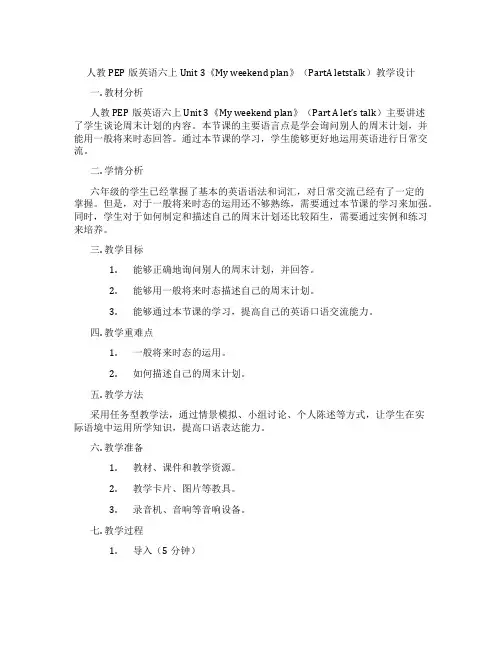
人教PEP版英语六上Unit 3《My weekend plan》(PartA letstalk)教学设计一. 教材分析人教PEP版英语六上Unit 3《My weekend plan》(Part A let’s talk)主要讲述了学生谈论周末计划的内容。
本节课的主要语言点是学会询问别人的周末计划,并能用一般将来时态回答。
通过本节课的学习,学生能够更好地运用英语进行日常交流。
二. 学情分析六年级的学生已经掌握了基本的英语语法和词汇,对日常交流已经有了一定的掌握。
但是,对于一般将来时态的运用还不够熟练,需要通过本节课的学习来加强。
同时,学生对于如何制定和描述自己的周末计划还比较陌生,需要通过实例和练习来培养。
三. 教学目标1.能够正确地询问别人的周末计划,并回答。
2.能够用一般将来时态描述自己的周末计划。
3.能够通过本节课的学习,提高自己的英语口语交流能力。
四. 教学重难点1.一般将来时态的运用。
2.如何描述自己的周末计划。
五. 教学方法采用任务型教学法,通过情景模拟、小组讨论、个人陈述等方式,让学生在实际语境中运用所学知识,提高口语表达能力。
六. 教学准备1.教材、课件和教学资源。
2.教学卡片、图片等教具。
3.录音机、音响等音响设备。
七. 教学过程1.导入(5分钟)通过播放一段关于孩子们周末生活的视频,激发学生的学习兴趣,并引导学生谈论自己的周末计划。
2.呈现(10分钟)教师通过展示教材中的插图和文字,引导学生关注本节课的主要内容。
同时,教师可以运用教学卡片、图片等教具,帮助学生理解和记忆单词和短语。
3.操练(15分钟)学生分角色扮演,模拟教材中的对话,进行口语练习。
教师可以学生进行小组讨论,让学生互相提问并回答关于周末计划的问题。
4.巩固(10分钟)教师可以设计一些练习题,让学生在纸上完成,以巩固所学知识。
同时,教师可以通过听录音、模仿等方式,帮助学生提高口语表达能力。
5.拓展(10分钟)教师可以引导学生运用所学知识,编写自己的周末计划,并进行个人陈述。
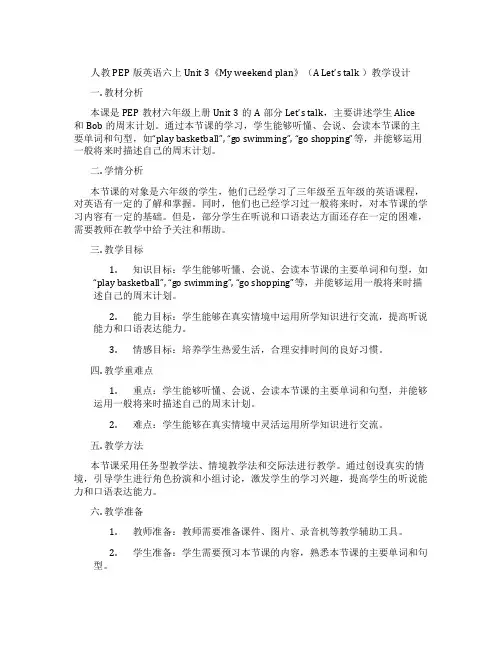
人教PEP版英语六上Unit 3《My weekend plan》(A Let’s talk )教学设计一. 教材分析本课是PEP教材六年级上册Unit 3的A部分Let’s talk,主要讲述学生Alice和Bob的周末计划。
通过本节课的学习,学生能够听懂、会说、会读本节课的主要单词和句型,如“play basketball”, “go swimming”, “go shopping”等,并能够运用一般将来时描述自己的周末计划。
二. 学情分析本节课的对象是六年级的学生,他们已经学习了三年级至五年级的英语课程,对英语有一定的了解和掌握。
同时,他们也已经学习过一般将来时,对本节课的学习内容有一定的基础。
但是,部分学生在听说和口语表达方面还存在一定的困难,需要教师在教学中给予关注和帮助。
三. 教学目标1.知识目标:学生能够听懂、会说、会读本节课的主要单词和句型,如“play basketball”, “go swimming”, “go shopping”等,并能够运用一般将来时描述自己的周末计划。
2.能力目标:学生能够在真实情境中运用所学知识进行交流,提高听说能力和口语表达能力。
3.情感目标:培养学生热爱生活,合理安排时间的良好习惯。
四. 教学重难点1.重点:学生能够听懂、会说、会读本节课的主要单词和句型,并能够运用一般将来时描述自己的周末计划。
2.难点:学生能够在真实情境中灵活运用所学知识进行交流。
五. 教学方法本节课采用任务型教学法、情境教学法和交际法进行教学。
通过创设真实的情境,引导学生进行角色扮演和小组讨论,激发学生的学习兴趣,提高学生的听说能力和口语表达能力。
六. 教学准备1.教师准备:教师需要准备课件、图片、录音机等教学辅助工具。
2.学生准备:学生需要预习本节课的内容,熟悉本节课的主要单词和句型。
七. 教学过程1.导入(5分钟)教师通过与学生进行简单的口语交流,如询问学生今天的心情、天气等,引导学生进入英语学习状态。
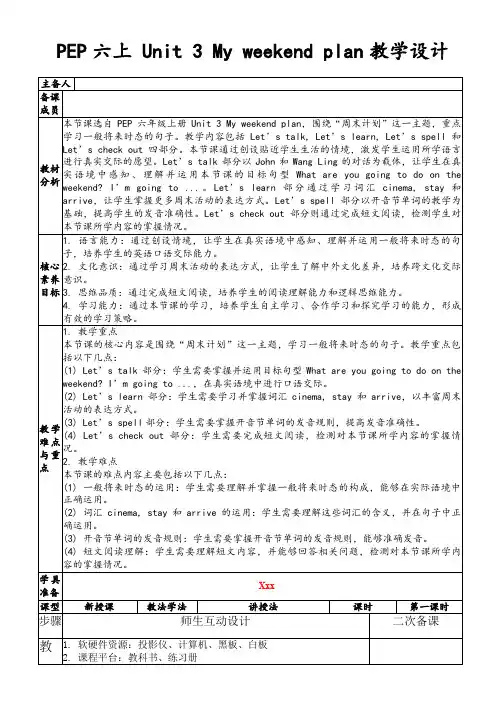
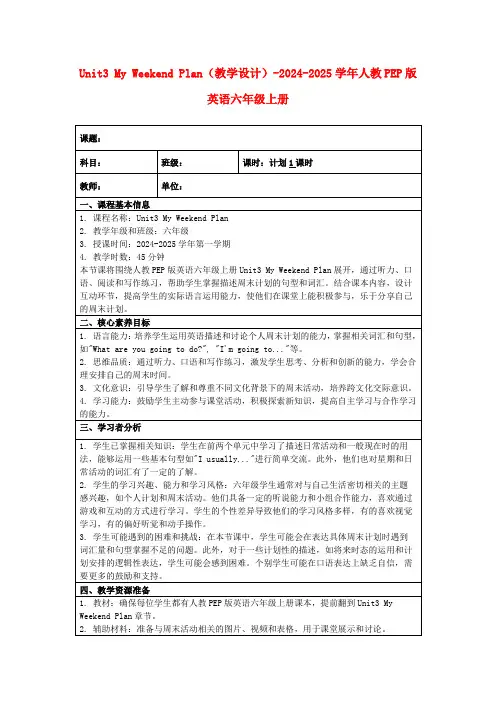
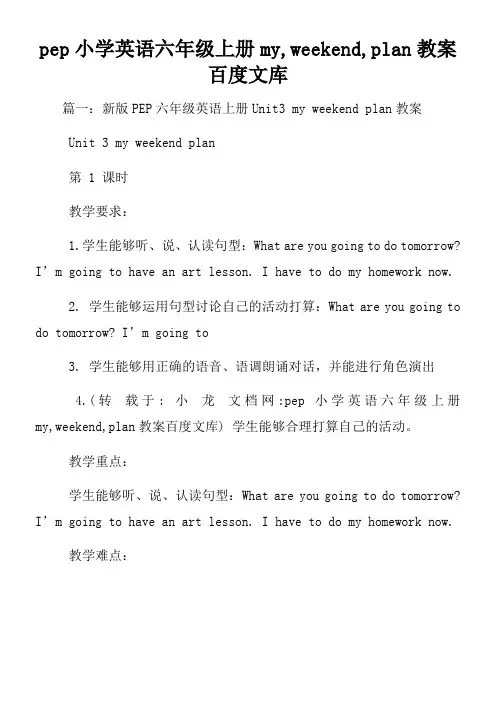
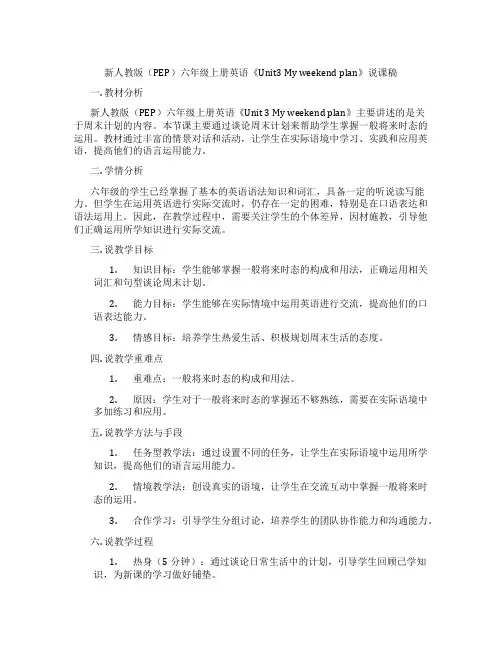
新人教版(PEP)六年级上册英语《Unit3 My weekend plan》说课稿一. 教材分析新人教版(PEP)六年级上册英语《Unit 3 My weekend plan》主要讲述的是关于周末计划的内容。
本节课主要通过谈论周末计划来帮助学生掌握一般将来时态的运用。
教材通过丰富的情景对话和活动,让学生在实际语境中学习、实践和应用英语,提高他们的语言运用能力。
二. 学情分析六年级的学生已经掌握了基本的英语语法知识和词汇,具备一定的听说读写能力。
但学生在运用英语进行实际交流时,仍存在一定的困难,特别是在口语表达和语法运用上。
因此,在教学过程中,需要关注学生的个体差异,因材施教,引导他们正确运用所学知识进行实际交流。
三. 说教学目标1.知识目标:学生能够掌握一般将来时态的构成和用法,正确运用相关词汇和句型谈论周末计划。
2.能力目标:学生能够在实际情境中运用英语进行交流,提高他们的口语表达能力。
3.情感目标:培养学生热爱生活、积极规划周末生活的态度。
四. 说教学重难点1.重难点:一般将来时态的构成和用法。
2.原因:学生对于一般将来时态的掌握还不够熟练,需要在实际语境中多加练习和应用。
五. 说教学方法与手段1.任务型教学法:通过设置不同的任务,让学生在实际语境中运用所学知识,提高他们的语言运用能力。
2.情境教学法:创设真实的语境,让学生在交流互动中掌握一般将来时态的运用。
3.合作学习:引导学生分组讨论,培养学生的团队协作能力和沟通能力。
六. 说教学过程1.热身(5分钟):通过谈论日常生活中的计划,引导学生回顾已学知识,为新课的学习做好铺垫。
2.引入(10分钟):展示一幅周末活动的图片,引导学生猜测并说出相关词汇,激发学生的学习兴趣。
3.呈现(10分钟):通过展示教材中的情景对话,引导学生学习一般将来时态的构成和用法。
4.操练(10分钟):设置不同的任务,让学生在小组内运用所学知识进行交流,巩固所学内容。
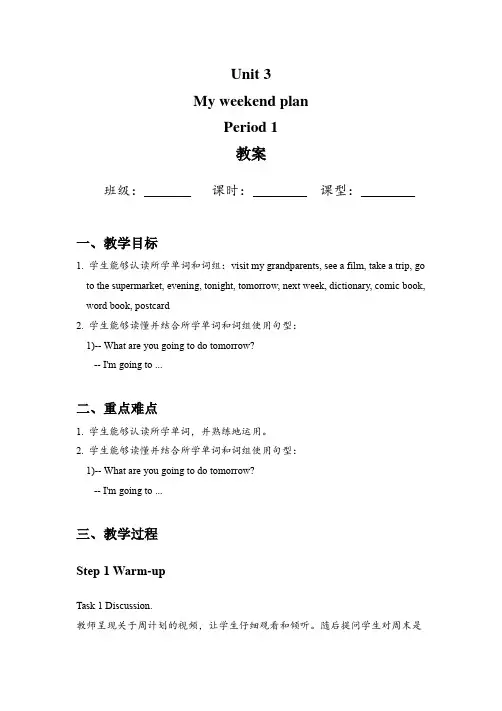
Unit 3My weekend planPeriod 1教案班级:课时:课型:一、教学目标1. 学生能够认读所学单词和词组:visit my grandparents, see a film, take a trip, go to the supermarket, evening, tonight, tomorrow, next week, dictionary, comic book, word book, postcard2. 学生能够读懂并结合所学单词和词组使用句型:1)-- What are you going to do tomorrow?-- I'm going to ...二、重点难点1. 学生能够认读所学单词,并熟练地运用。
2. 学生能够读懂并结合所学单词和词组使用句型:1)-- What are you going to do tomorrow?-- I'm going to ...三、教学过程Step 1 Warm-upTask 1 Discussion.教师呈现关于周计划的视频,让学生仔细观看和倾听。
随后提问学生对周末是否有计划,展开讨论。
【设计意图】通过看视频吸引学生注意力,通过讨论活跃课堂气氛,为本课时学习做铺垫。
Step 2 PresentationTask 1 Look and listen.教师首先呈现课本中Part A和Part B Let’s learn的视频,让学生仔细观看和倾听。
【设计意图】通过看和听相结合的方式,帮助学生初步了解本课时所学内容,为深入学习做铺垫。
Task 2 Look, listen and read.教师通过图片和句子引入单个单词和词组,随后播放音频,让学生跟读。
接着教师分别呈现Part A和Part B Let’s learn的单词和词组集合和对应图片,播放音频要求学生跟读。
【设计意图】结合图片及句子教授单词词组,加深学生对单词词组的理解,提升学生的运用能力。
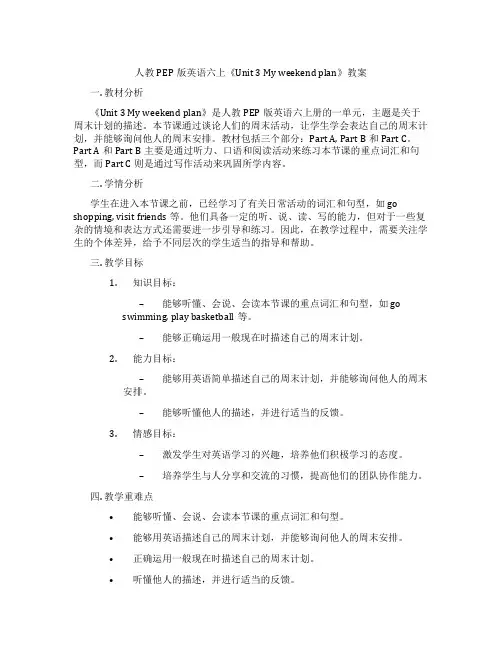
人教PEP版英语六上《Unit 3 My weekend plan》教案一. 教材分析《Unit 3 My weekend plan》是人教PEP版英语六上册的一单元,主题是关于周末计划的描述。
本节课通过谈论人们的周末活动,让学生学会表达自己的周末计划,并能够询问他人的周末安排。
教材包括三个部分:Part A, Part B和Part C。
Part A和Part B主要是通过听力、口语和阅读活动来练习本节课的重点词汇和句型,而Part C则是通过写作活动来巩固所学内容。
二. 学情分析学生在进入本节课之前,已经学习了有关日常活动的词汇和句型,如go shopping, visit friends等。
他们具备一定的听、说、读、写的能力,但对于一些复杂的情境和表达方式还需要进一步引导和练习。
因此,在教学过程中,需要关注学生的个体差异,给予不同层次的学生适当的指导和帮助。
三. 教学目标1.知识目标:–能够听懂、会说、会读本节课的重点词汇和句型,如go swimming, play basketball等。
–能够正确运用一般现在时描述自己的周末计划。
2.能力目标:–能够用英语简单描述自己的周末计划,并能够询问他人的周末安排。
–能够听懂他人的描述,并进行适当的反馈。
3.情感目标:–激发学生对英语学习的兴趣,培养他们积极学习的态度。
–培养学生与人分享和交流的习惯,提高他们的团队协作能力。
四. 教学重难点•能够听懂、会说、会读本节课的重点词汇和句型。
•能够用英语描述自己的周末计划,并能够询问他人的周末安排。
•正确运用一般现在时描述自己的周末计划。
•听懂他人的描述,并进行适当的反馈。
五. 教学方法1.任务型教学法:通过设定各种任务,让学生在实际情境中运用所学知识,提高他们的语言实际运用能力。
2.情境教学法:通过创设各种情境,让学生在轻松愉快的氛围中学习英语,提高他们的学习兴趣。
3.交际法:通过生生、师生之间的互动,培养学生的交际能力,提高他们的语言实际运用能力。
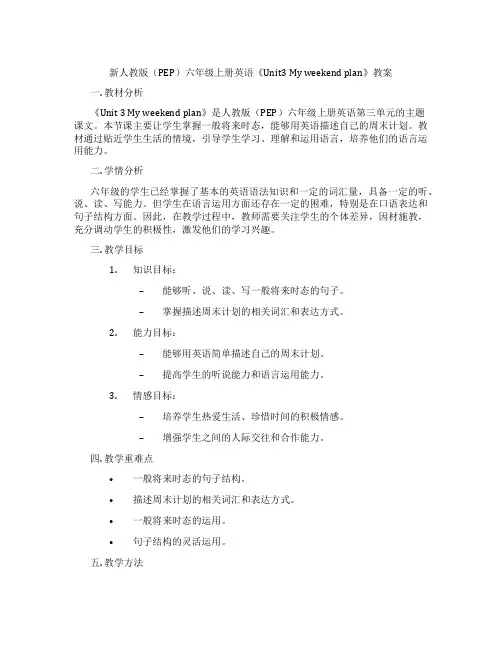
新人教版(PEP)六年级上册英语《Unit3 My weekend plan》教案一. 教材分析《Unit 3 My weekend plan》是人教版(PEP)六年级上册英语第三单元的主题课文。
本节课主要让学生掌握一般将来时态,能够用英语描述自己的周末计划。
教材通过贴近学生生活的情境,引导学生学习、理解和运用语言,培养他们的语言运用能力。
二. 学情分析六年级的学生已经掌握了基本的英语语法知识和一定的词汇量,具备一定的听、说、读、写能力。
但学生在语言运用方面还存在一定的困难,特别是在口语表达和句子结构方面。
因此,在教学过程中,教师需要关注学生的个体差异,因材施教,充分调动学生的积极性,激发他们的学习兴趣。
三. 教学目标1.知识目标:–能够听、说、读、写一般将来时态的句子。
–掌握描述周末计划的相关词汇和表达方式。
2.能力目标:–能够用英语简单描述自己的周末计划。
–提高学生的听说能力和语言运用能力。
3.情感目标:–培养学生热爱生活、珍惜时间的积极情感。
–增强学生之间的人际交往和合作能力。
四. 教学重难点•一般将来时态的句子结构。
•描述周末计划的相关词汇和表达方式。
•一般将来时态的运用。
•句子结构的灵活运用。
五. 教学方法1.情境教学法:通过设定生活情境,让学生在实际语境中学习和运用语言。
2.交际教学法:引导学生进行小组合作、角色扮演等互动活动,提高学生的语言运用能力。
3.任务型教学法:设计具有实际意义的学习任务,让学生在完成任务的过程中学习和运用语言。
六. 教学准备1.教材、课件和教学资源。
2.教学卡片、图片等辅助教具。
3.录音机、投影仪等教学设备。
七. 教学过程1.导入(5分钟)–教师通过提问方式引导学生谈论自己的周末计划,激发学生的学习兴趣。
–学生分享自己的周末计划,教师给予鼓励和反馈。
2.呈现(10分钟)–教师展示本节课的主题和目标,引导学生关注一般将来时态。
–通过图片、卡片等辅助教具,呈现描述周末计划的相关词汇和表达方式。
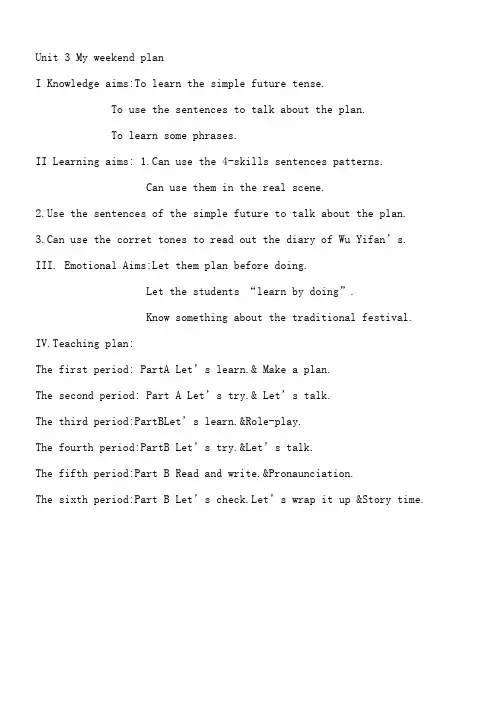
Unit 3 My weekend planI Knowledge aims:To learn the simple future tense.To use the sentences to talk about the plan.To learn some phrases.II Learning aims: 1.Can use the 4-skills sentences patterns.Can use them in the real scene.e the sentences of the simple future to talk about the plan.3.Can use the corret tones to read out the diary of Wu Yifan’s. III. Emotional Aims:Let them plan before doing.Let the students “learn by doing”.Know something about the traditional festival. IV.Teaching plan:The first period: PartA Let’s learn.& Make a plan.The second period: Part A Let’s try.& Let’s talk.The third period:PartBLet’s learn.&Role-play.The fourth period:PartB Let’s try.&Let’s talk.The fifth period:Part B Read and write.&Pronaunciation.The sixth period:Part B Let’s check.Let’s wrap it up &Story time.Unit 3 the First PeriodI.Teaching contents: PartA Let’s learn.& Make a plan.II.Teaching aims:Learn some phrases of the future time.Learn some phrases about something to do in the free time.III.Teaching key points:Use the phrases exactly.IV.Teaching difficulties:Write the phrases and use them.V.Teaching aids:PPT and the Multi-media.VI:.Teaching procedure:StepI Revision1.Show out some picture by the PPT,then talk with the students.As:What do you usually do on Sunday? I often….2.Revise some phrases of verd.As:fly kites,catch butterflies,collectleaves.StepII Presentation3.Depand on the talk,to show out of the pictures and then draw out of thenew phrases:visit my grandparents,see a film,take a trip and go to the supermarket.4.Show out the pictures of the times to learn the phrases of the future time. As:this morning,this afternoon,this evening,tonight,tomorrow and next week.5.Let the students to talk their weekend plan.What are you going to do this weekend?I’m going to….Step III Practice6.Make a plan.It’s Saturday morning now.Make a plan and share it with your partner.7.Play a game guess.What is she/he going to do?Step IV HomeworkMake a weekend plan for your family.Step V Bb writing:What are you going to do ?this morning/this afternoon/thisevening/next week/tonight.I’m going to ?visit my grandparents/see a film/go to thesupermarket/take a trip.Unit 3 the Second PeriodI.Teaching contents: Part A Let’s try.& Let’s talk.II.Teaching aims:They can act out of the dialogue.Can use the sentence partten ‘be going to” to talk in the daily life.III.Teaching key points:Can act out the dialogue.IV.Teaching difficulties:Can use “be going to”to talk about something will do or will happen.V.Teaching aids: PPT and the Multi-media.VI:.Teaching procedure:StepI Warming upShow out a chant.Let them read it out.Tomorrow,tomorrow, I am going to see a film tomorrow.Tonight,tonight,she is going to watch TV tonight. …StepII Presentation &Practice1.Show out the picture of Main Scene.Then talk about it.As:Who are they? What are they talking about?2.Discuss the question about it.3.Then read after the video.StepIII Let’s try.&Let’s talk.1.Listen to the tape.Then try to finish the exercises in the book.2.Ask some questions about the dialogue.As:What is Sarah going to do tomorrow?What is Mike going to do?What does Mike have to do now?3.Look at the video,then find out the answer of the question.4.Learn to read the dialogue.5.Act out the dialogue in group.e the key sentences to make a new dialogue.What are you going to do tomorrow?I’m going to…We’re going to….I have…StepIV Consolidation&Extension1.Talk about the weekend plan about yours and your friends’.2.Make a survey.Step 5 Homework1.Listen and read the dialogue.2.Finish the exercises in the workbook.Bb writing:Unit 3 the Second PeriodWhat are you going to do ?I am going to ?Unit 3 the Third PeriodI.Teaching contents: PartBLet’s learn.&Role-play.II.Teaching aims:Can use some simples sentences to talk about shopping. Can act out the dialogue in role-play.Learn to enjoy helpingthe other.III.Teaching key points:Act out the dialogue in the text.IV.Teaching difficulties:Use somet sentences to talk about shopping in theshop.V.Teaching aids: PPT and the Multi-media.VI:.Teaching procedure:StepI Warming up& Revision1.Free talk.Depend on the picture in the PPT to revise the words of the schoolthings.2.Then draw out what will you want to buy in the bookstore?3.Say a chant.As:ruler,ruler,do you want rulers?Book,book, do you wantbooks?Pencil,pencil,do you want pencils?School things,school things,I want them all.4.Ask and answer.Show out the pictures and talk about them.StepII Prensentation & Practice1.Let’s learn.Depend on the PPT to draw out the new ic book,dictionary,postcard,word book.e the new words to talk,then practice them.3.Role-play.Show the scene of shopping.Then learn to act how to buy or sellsomething in the shop.Practise the important sentences :Can I help you?What are you going to buy?Do you have …? Here they are.4.Let the students to act out it.StepIII Consolidation&Extensione the sentences you learn from this lesson to make new dialogue.2Act out your new dialogue with your partner.StepIV Homework1.Recite the 4-skills words.2.Finish the exercises in the workbooks.Bb writing:Unit 3 the Third PeriodComic book word book postcard dictionary-dictionariesCan I help you? Yes, I want to buy…. What are you going to buy?I’m going to buy….Unit 3 the fourth PeriodI.Teaching contents: PartB Let’s try.&Let’s talk.II.Teaching aims:Can act out of the e the sentences in the dialogue to talk in the daily life.Can use “what,where,when ”to ask about the plan. III.Teaching key points:Can act out the dialogue.IV.Teaching difficulties:Can use “be going to”to talk about the plan. V.Teaching aids: PPT and the Multi-media.VI:.Teaching procedure:StepI Warming up& Revision1.Let’s watch the video.Show a video about the space.Let them cheer outwith the space.2.Let’s try.Observe the picture in Let’s try.Then ask and answer thequestions.Step II Presentation & Practice1.Depend on the video of the dialogue to learn to say ,read and understandthe what did they talking about.2.Watch the video again ,then answer the questions.As:What are they going to do? Where are they going? When are they going?3.Read the dialogue loudly,then do some exercises of it.4.Act out the dialogue in group.5.Show out the action.StepIII Consolidation&Extension1.Act the dialogue in group .Then act it out.2.Make a poster for the Space Travel.StepIV HomeworkLisen,read and act out the dialogue.Bb writing:Unit3 The Fourth PeriodUnit 3 the fifth PeriodI.Teaching contents: Part B Read and write.&Pronaunciation.II.Teaching aims:Can read and talk the text.Know some different festival in our country and the Western country.III.Teaching key points:Read and retell the text.IV.Teaching difficulties:Can talk about the important festival in our country and the western countries.V.Teaching aids: PPT and the Multi-media.VI:.Teaching procedure:StepI Warming up & Revision1.Show out the festivals in western countries.What festivals can you see?Do you know them?2.Talk about them.StepII Presentation1.Show out three pictures .Talk about something of the festivals. National Day,the Spring Festival, the Mid-Autumn FestivalWhat do you know about these festivals?Can you say some other festivals?2.Depend on the questions to listen to the tape.3.Find out the answer of the questions.Step III Practice1.Read the text.Then discuss in group then finish the questions.A.What is Wu Yifan’s aunt going to do?B.What will Wu Yifan’s grandma do?C.What are Wu Yifan and Robin going to do?2.Read the text together or one by one.then transtate it in Chinese.3.Listen to the “Tips for pronunciation”,learn to read after it.Step IV Homework1.Read and retell the text.2.Finish the exercises in the workbooks.Bb writing:Unit 3 the Fifth PeriodMid-Autumn Festival will=be going toWhat are you going to do for Mid-Autumn Festival?I’m going to….Unit 3 the sixth PeriodI.Teaching contents: Part B Let’s check.Let’s wrap it up &Story time. II.Teaching aims:Can retell the story.Can use “will or be going to ”to talk about something will do.III.Teaching key points:Can read and understand the story.IV.Teaching difficulties:Know how to use “will and be going to”exactly. V.Teaching aids: PPT and the Multi-media.VI:.Teaching procedure:StepI Warming up&Revision1.Let’s sing. Sing “What are you going to do?”2.Talk something about the festivals.StepII Presentation &Practice1.Let’s check.Listen to the tape ,then tick the correct one.2.Let’s wrap it up.Sort the words,then let the students read them out.。
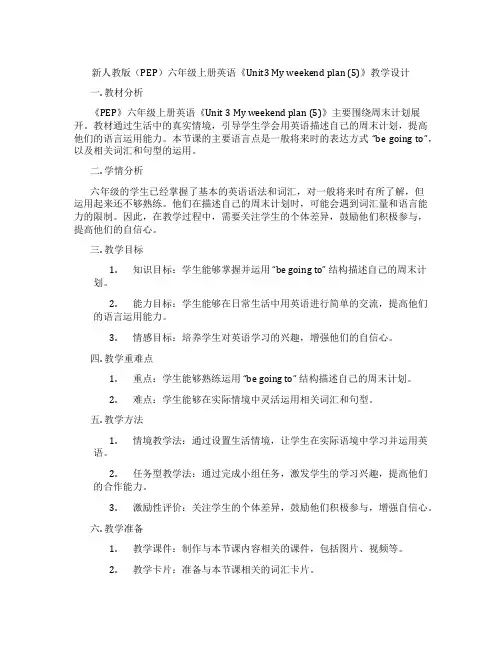
新人教版(PEP)六年级上册英语《Unit3 My weekend plan (5)》教学设计一. 教材分析《PEP》六年级上册英语《Unit 3 My weekend plan (5)》主要围绕周末计划展开。
教材通过生活中的真实情境,引导学生学会用英语描述自己的周末计划,提高他们的语言运用能力。
本节课的主要语言点是一般将来时的表达方式“be going to”,以及相关词汇和句型的运用。
二. 学情分析六年级的学生已经掌握了基本的英语语法和词汇,对一般将来时有所了解,但运用起来还不够熟练。
他们在描述自己的周末计划时,可能会遇到词汇量和语言能力的限制。
因此,在教学过程中,需要关注学生的个体差异,鼓励他们积极参与,提高他们的自信心。
三. 教学目标1.知识目标:学生能够掌握并运用“be going to” 结构描述自己的周末计划。
2.能力目标:学生能够在日常生活中用英语进行简单的交流,提高他们的语言运用能力。
3.情感目标:培养学生对英语学习的兴趣,增强他们的自信心。
四. 教学重难点1.重点:学生能够熟练运用“be going to” 结构描述自己的周末计划。
2.难点:学生能够在实际情境中灵活运用相关词汇和句型。
五. 教学方法1.情境教学法:通过设置生活情境,让学生在实际语境中学习并运用英语。
2.任务型教学法:通过完成小组任务,激发学生的学习兴趣,提高他们的合作能力。
3.激励性评价:关注学生的个体差异,鼓励他们积极参与,增强自信心。
六. 教学准备1.教学课件:制作与本节课内容相关的课件,包括图片、视频等。
2.教学卡片:准备与本节课相关的词汇卡片。
3.小组活动准备:划分学习小组,准备相关任务材料。
七. 教学过程1.导入(5分钟)通过提问方式引导学生回顾一般将来时的表达方式“be going to”,激发学生的学习兴趣。
2.呈现(10分钟)利用课件、图片等展示本节课的主要内容,引导学生观察并思考:这些图片中的孩子们周末将要做什么?3.操练(10分钟)学生分组进行角色扮演,运用“be going to” 结构描述周末计划。
Unit3 My Weekend PlanLet's learn、make a plan 教学设计教学目标:1.能够听说读写本课时主要单词或词组;visit, visit my grandparents, go to the supermarket , trip, take a trip ,film see a film ,evening, tonight , tomorrow, next week.2.能够听说认读句子;What are you going to do…?I’m going to…并能在实际情景中正确运用。
教学重难点:1.学习单词和词组。
2.能够听说认读句子:What are you going to do…?I am going to …并能在实际情景中正确运用。
教具:1.单词卡2. 多媒体课件1.Greeting2.Free talk:What’s the weather like today? How do you go to school? What do you do on the weekend?揭示课题:My Weekend Plan1.T: Do you like weekend? Why do you like weekend ?Yeah, On the weekend, Don’t go to school, we can do many things we like. Right? but this weekend I will busy, so I must change my weekend plan.板书课题:My Weekend Plan带读2.learn: visit, visit my grandparentsT:Look at the screen. What can you see?呈现单词visit 教读visit Visit who?(出示课件:Wow, Who are they?(Grandpa and grandma. Are they young? Say hello to them, OK? Grandpa and grandma , we can also say grandparents. This weekend, I am going to visit my grandparents.(1)带读visit my grandparents, visit, visit, visit my grandparents 同时学生拼读教师板书。
人教PEP版英语六年级上册Unit 3《My weekend plan》教案一. 教材分析本单元的主题是“My weekend plan”,主要让学生学会描述自己的周末计划。
通过本单元的学习,学生能够听懂、会说、会写关于周末计划的相关词汇和句子,并能够运用所学知识进行简单的交流。
二. 学情分析六年级的学生已经具备了一定的英语基础,对于描述日常生活的事物和情感已经能够进行简单的交流。
但是,对于一些复杂的句型和表达方式还需要进一步的引导和练习。
三. 教学目标1.能够听懂、会说、会写关于周末计划的相关词汇和句子。
2.能够运用所学知识进行简单的交流,描述自己的周末计划。
3.培养学生的语言运用能力和团队协作能力。
四. 教学重难点1.能够正确运用一般现在时描述自己的周末计划。
2.能够运用所学词汇和句子进行简单的交流。
五. 教学方法采用任务型教学法,情境教学法,分组合作学习等教学方法,引导学生通过观察、思考、交流、实践等方式,掌握描述周末计划的语言知识,提高语言运用能力。
六. 教学准备1.教学课件、图片等教学资源。
2.学生周末计划表。
3.录音机、磁带等教学设备。
七. 教学过程1.导入(5分钟)利用图片和问题引导学生思考和讨论:“What do you usually do on weekends?”,让学生回顾和复习关于周末活动的词汇和句子。
2.呈现(5分钟)通过课件展示本课的主要词汇和句子,如:“I usually watch TV/play basketball on weekends.”,同时引导学生跟读,确保学生能够正确发音。
3.操练(10分钟)将学生分成小组,每组发放一份周末计划表,让学生用英语完成表格,然后进行小组内的交流和分享。
教师巡回指导,纠正学生的错误,并给予鼓励。
4.巩固(10分钟)设计一个角色扮演的活动,让学生模拟真实的场景,运用所学知识进行对话。
如:“A: Hi, B. What are you doing? B: I’m cleaning my room. A: Oh, really? I’m goingto the movies with my friends this weekend.”5.拓展(10分钟)让学生结合自己的生活实际,思考和讨论:“What will you do next weekend?”,并鼓励学生用英语进行表达。
Unit 3 My weekend planA Let's talk Period 2教案班级:_______ 课时:_______ 课型:_______一、教学目标1. 学生能够学习be going to的用法。
2. 学生能够学习谈论周末活动计划的句型:--What are/is ... going to do ...?--I'm ... He/She is going to ...二、重点难点1. 学生能够熟练运用be going to的用法。
2. 学生能够灵活运用本课时句型谈论周末活动计划。
三、教学过程Step 1 Warm-up and revisionTask 1 Sharp eyes.教师首先点击屏幕逐一出现图片,学生大声说出相应单词短语,随后教师点击屏幕出现图片对应的单词短语。
【设计意图】通过练习初步了解本课时要学习的内容。
Task 2 Let's sing.教师呈现歌曲"What are you going to do?",学生认真观看并跟唱。
【设计意图】通过看视频吸引学生注意力,活跃课堂气氛。
Step 2 PresentationTask 1 Let's try.(1)教师呈现Sarah和Mike打电话的情境。
(2)教师呈现问题和答案选项,并播放音频。
学生先根据音频内容圈出正确答案,随后教师公布答案。
(3)教师先呈现听力原文并再次播放听力音频,随后教师带领学生一起划出重点内容。
【设计意图】通过看、听、思考相结合的方式,帮助学生理解本课时对话内容。
Task 2 Watch and fill.(1)教师首先呈现日历和问题,学生根据日历回答问题,随后教师提出问题:"What are they going to do tomorrow?"。
(2)教师提出问题,随后播放视频,让学生认真观看。
(3)学生先根据视频内容补全句子,随后教师公布答案。
Unit 3 my weekend plan第2课时教学要求:1.学生能够听、说、读、写本课核心词组:visit my grandparents,see a film, take a trip, go th the supermarket2.学生能够运用核心句型What are you going to do tomorrow? P m going to seea film.在真实的情境中进行交流周末计划。
3.学生能够合理安排和计划自己的周末生活。
教学重点:三个四会词组和两个句型。
教学难点:能包多合理和科学地安排自己的周末生活教学媒体Pictures, CAI,教学过程:Step One: warming up and revision Sing a song together: What are you going to do? 1.Free talk: What are you going to do this weekend?I'm going to...Step Two: Presentation and practice Sarah and Chen are talking about their plan, too. Let's listen and answer.(1)What is Chen Jie going to do today?She is going to see a film.Choose the picture of“ see a film”Learn to say.Write it on the board.1.Present "today, tomorrow, this morning, this afternoon, this evening”What are you going to do this morning/ this afternoon/ evening?S: I'm going to...(1)Make the students understand the meaning.(2)Write the words on the board, and spell the words.2.Present “tonight”I'm going to read a book tonight. What are you going to do toni ght?(1)Understand the meaning:通过日期和实践的选择让他们明白意思。
新版PEP7 Unit 3 my weekend plan教学设计
3.Feedback
4.An exercises: choose “where, what , when”
_______ are you going to do I’m going to visit my grandparents.
_______ are you going I’m going on Saturday morning.
________ are you going I’m going to my grandparent s’ home.
板书设计:Unit 3 Pa rt B Let’s talk
Where are you going I’m/ We’re…
What are you going to do I’m/We’re..
When are you going I’m/We’re..
作业设计:
教学反思:
教材内容Unit 3 my weekend plan 上课
时间
总课时 6
第课时
教学要求1. 学生能够听、说、读、写本课的五个新单词: dictionary, comic book, word book, postcard;
2. 学生能够掌握并运用句型:Where are we going To the bookstore. What are you going to buy I’m going to buy …
3. 能够用What are you going to do Where/when…进行自由地表达与交流。
重点难点重点:dictionary的拼写
难点:区分what where when并作自
由的交流与运用
教学媒体
Pictures, CAI, 设计者教学设想施教者修改或点评
Step Two: Pre-reading
1. Show the students some pictures and ask:
What are these holidays
National Holiday Spring Festival Christmas What do your family do on these holidays
Give them some hints and choose:
Set fire works go shopping get together buy presents have a big dinner.
Step Three: While-reading
(1) Show them another picture of “Mid-autumn Festival”What holiday is it
What do your family do on this holiday
(2 )Read and answer.
教师This is Wu Yifan’s diary. Let’s read the diary.
教师课件呈现以下问题:
➢What are Wu Yifan’s family going to do
学生阅读后对问题
➢His family will get together.
➢讲解will = be going to
(2)Read and finish the table.
➢What are Wu Yifan and Robin going to do
➢What is Wu’s aunt going to do
➢What is Wu’s grandma going to do
(3) Check the answers
Step Four: post reading
1. 课文朗读(Listen and Read)
(1) Have Ss listen to the tape.
Tips: 仔细听录音,体会录音中的升降调、重音和意群的停顿。
(2) Listen again and read after the tape..
Tips: 听录音跟读, 听一听单词:lesson dinner tonight tomorrow
语音指导:单词的重音
(3) 重点指导Poem
F is for family. A is for autumn. M is for moon. I is for “I”. L
is for love. Y is for you.
Who can read it beautifully.
(4) Read the whole poem in pairs.
2. 课本个性化书写活动
(1) Discuss with your partner. What are you going to do
for Mid-autumn Festival
➢先让学生同桌口头交流。
➢教师将最后一位学生的回答在投影仪下示范书写,然
后提出一星和两星要求,请学生个性化书写。
(2) Write down your plan.
For Mid-Autumn Festival, I’m going to ___________
___________________.
My partner is going to _________________________
___________________.
Step five: homework
Listen and read the text.
板书设计:Unit 3What would you like
B. Read and write
作业设计:
教学反思:
教材
内容
Unit 3 my weekend plan 上课
时间
总课时 6
第课时
教学
要求
1.复习一般将来时态的三个核心问句以及回答:What are you going to
do When are you going Where are you going
2.巩固一般将来时的句法要点,能够用不同的主语进行be going to的造
句以及自由表达。
3.能理解、听懂并讲Story time中的故事。
重点
难点
重点:一般将来时的语法要点复习。
难点:能在实际情景中灵活运用以及
正确的回答
教学媒体
Pictures, CAI,
设计者教学设想施教者修改或点评
Step One: warming up
1. Free talks: What are you going to do When are you going Where are you going
Step Two: Wrap it up
1.教师将提到的三个问题写到黑板上,并询问一般将来时的特点。
(1)be going to
Review: I am going to/ He/She is going to/ We/They/You are going to…
Practice: I _____ going to…
He ____ going to see a film.
They ____going to watch TV.
(2)时间状语:this morning this afternoon this evening tonight tomorrow next week
2. How many sentences can you make
(1)Talk about it in pairs.
(2)Feedback.
3.Do the exercises on the English book
(1)Listen and tick.
(2)Fill in the blanks:
1. John is going to ____ _____ ____ tomorrow afternoon.
2. This evening the boy is going to ______ ______ ______ _______.
3. The boy is ______ ______ ______ ______.
4. The woman is going to ____ _____ ____.
Step Three: Story Time。